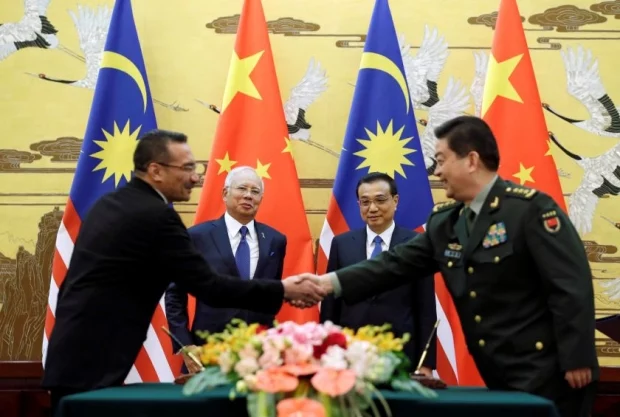KUALA LUMPUR, Nov 3 — Malaysia’s growing economic and defence ties with China does not mean it is moving away from ally and trade partner US, analysts have said.
Shahriman Lockman, a senior analyst in the Institute of Strategic and International Studies (ISIS) Malaysia, said Malaysia remains close to the US despite Prime Minister Datuk Seri Najib Razak’s current six-day visit to China — which saw a flurry of deals for investments worth almost RM144 billion being signed.
“There’s been a lot of misguided commentary about how this visit represents a Malaysian pivot towards China, that somehow this is a blow to US influence in this region. But let’s not allow perceptions to get ahead of reality.
“The Malaysia-US relationship is pretty robust. The US is still one of the top sources of FDI (foreign direct investment) for Malaysia. The Malaysian Armed Forces conducts exercises far more regularly with the US than with any other country,” he told Malay Mail Online when contacted yesterday.
While there may be “kinks” in the Malaysia-US relationship, this was expected of diplomatic ties, he said.
“And let’s give the PM a little credit here: he knows what he’s doing — he’s not going to put all of our eggs in the China basket,” he added.
Dr Ooi Kee Beng, the deputy director of Singapore’s ISEAS-Yusof Ishak Institute, indicated that Malaysia will still be able to stay close to the US.
“Remaining close to the US is not really a problem. I don’t think it has to be a zero-sum game. Diplomacy and international relations have many bottoms and many layers to exploit,” he told Malay Mail Online yesterday.
Universiti Malaya’s (UM) Dr Ngeow Chow Bing said there will inevitably be some who interpret Malaysia’s and China’s deepening ties “as something of a loss to the US or its Western partners”, but said that he believes Malaysia wants to maintain good ties with both countries at the same time.
“A good relationship with China does not have to come at the expense of relationship with the US, it is not necessarily a zero-sum game. It is not in Malaysia’s interests to tilt to one side at the expense of others,” the senior lecturer at UM’s Institute of China Studies told Malay Mail Online yesterday.
As for Malaysia’s decision to purchase and jointly work on navy vessels with China, this is part of growing defence ties between the two since 2005 where they signed a Memorandum of Understanding (MOU) on defence cooperation, Ngeow said.
The Malaysia-China defence ties go beyond arms procurement and extend to mutual visits of top defence officials, exchange of military students, strategic dialogue and also last year’s joint military exercise, he said.
“All these testify to the growing military-to-military ties, but it has to be put in a perspective, in which the growing defense ties are much slower compared to China-Malaysia economic relations or cultural relations.
It is growing at the pace that both sides feel comfortable with. The navy vessel cooperation shows that it has reached the stage where Malaysia feels comfortable to procure Chinese arms more substantially,” he said.
City University of Hong Kong’s Prof William Case said that Malaysia appears to be sending “mixed signals” so far, with two senior ministers reportedly calling for different positions.
“The deputy prime minister has called for ‘balance’ in its relations between the US and China. Australia shows how this might be achieved.
Malaysia’s defense minister, however, is reported to have said that the government no longer cares what the US thinks. This is a much more aggressive posture.
“But whichever way this cuts, the urbane prime minister will avoid the coarse rhetoric of his Philippine counterpart, which at the time sounded like bridge-burning,” the academic at the university’s Asian and International Studies department told Malay Mail Online.
Philippines president Rodrigo Duterte had on October 20 announced during an official visit to China the “separation” of his country from the US both in terms of economic and military ties, but appeared to backtrack the next day by saying that it was not a “severance” of diplomatic ties.
In an editorial published in China’s state-run paper China Daily, Najib yesterday said that larger countries — including former colonial powers — should treat smaller countries fairly.
“It is not for them to lecture countries they once exploited on how to conduct their own internal affairs today,” he had said, asserting in the same piece the need to respect the sovereignty of countries as the era of foreign intervention is over.
Comments by Mr Shahriman Lockman which appeared in article written by Ida Lim and Shazwan Mustafa Kamal in MalayMail Online, 5 November 2016





